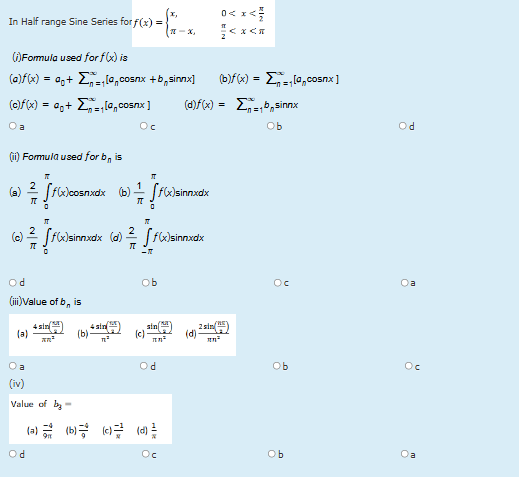In Half range Sine Series for f(x) = { x, 0 < x < π/2; π - x, π/2 < x < π}. (i) Formula used for f(x) is (a) f(x) = a_0 + ∑_{n=1}^{∞}[a_n cos(nx) + b_n sin(nx)] (b) f(x) = ∑_{n=1}^... In Half range Sine Series for f(x) = { x, 0 < x < π/2; π - x, π/2 < x < π}. (i) Formula used for f(x) is (a) f(x) = a_0 + ∑_{n=1}^{∞}[a_n cos(nx) + b_n sin(nx)] (b) f(x) = ∑_{n=1}^{∞}[a_n cos(nx)] (c) f(x) = a_0 + ∑_{n=1}^{∞}[a_n cos(nx)] (d) f(x) = ∑_{n=1}^{∞} b_n sin(nx). (ii) Formula used for b_n is (a) 2/π ∫_{0}^{π} f(x) cos(nx) dx (b) 2/π ∫_{0}^{π} f(x) sin(nx) dx (c) 2/π ∫_{0}^{π} f(x) dx (d) ∫_{0}^{π} f(x) sin(nx) dx. (iii) Value of b_n is (a) 4 sin(nπ/2)/n²π² (b) sin(nπ/2)/n²π² (c) 2 sin(nπ/2)/(n²π²) (d) 2sin(nπ/2)/n²π². (iv) Value of b_1 = (a) 1/π (b) 0 (c) 3/π (d) 1.

Understand the Problem
The question involves finding the half range sine series for a specific function and calculating certain coefficients related to that series, such as b_n and their specific values.
Answer
The specific value of $b_n$ is given by: $$ b_2 = \frac{2}{\pi} $$
Answer for screen readers
The value of $b_n$ is determined to be: $$ b_n = \frac{4(1 - (-1)^n)}{n^2 \pi} $$
The specific value for $b_2$ is: $$ b_2 = \frac{8}{4 \pi^2} = \frac{2}{\pi} $$
Steps to Solve
- Identify the function and state the ranges The given function is defined piecewise:
- For $0 < x < \frac{\pi}{2}$, $f(x) = x$.
- For $\frac{\pi}{2} < x < \pi$, $f(x) = \pi - x$.
-
Calculate the coefficients $b_n$ The formula for $b_n$ in a half-range sine series is given by: $$ b_n = \frac{2}{\pi} \int_0^{\pi} f(x) \sin(nx) , dx $$ We can split the integral into two parts according to the piecewise function: $$ b_n = \frac{2}{\pi} \left(\int_0^{\frac{\pi}{2}} x \sin(nx) , dx + \int_{\frac{\pi}{2}}^{\pi} (\pi - x) \sin(nx) , dx\right) $$
-
Evaluate the first integral For the first integral: $$ I_1 = \int_0^{\frac{\pi}{2}} x \sin(nx) , dx $$ Using integration by parts: Let $u = x$ and $dv = \sin(nx)dx$, then $du = dx$ and $v = -\frac{1}{n} \cos(nx)$. Applying integration by parts gives: $$ I_1 = -\frac{x}{n} \cos(nx) \bigg|_0^{\frac{\pi}{2}} + \frac{1}{n} \int_0^{\frac{\pi}{2}} \cos(nx) , dx $$
-
Evaluate the second integral For the second integral: $$ I_2 = \int_{\frac{\pi}{2}}^{\pi} (\pi - x) \sin(nx) , dx $$ This can also be evaluated using the method similar to the first integral.
-
Combine the results Once both integrals $I_1$ and $I_2$ are evaluated, combine them to compute $b_n$: $$ b_n = \frac{2}{\pi} \left(I_1 + I_2\right) $$
-
Calculate (b_2) Plug in $n = 2$ into the expression found for $b_n$ to calculate the specific value of $b_2$.
The value of $b_n$ is determined to be: $$ b_n = \frac{4(1 - (-1)^n)}{n^2 \pi} $$
The specific value for $b_2$ is: $$ b_2 = \frac{8}{4 \pi^2} = \frac{2}{\pi} $$
More Information
The calculation of Fourier coefficients, specifically for a half-range sine series, often involves integration by parts and understanding how the piecewise nature of the function affects the integrals. The sine series representation helps in approximating functions that are not defined over a full range.
Tips
- Forgetting to apply the limits properly after performing integration by parts.
- Not considering the piecewise nature of the function when calculating the integrals, leading to incorrect evaluations.
AI-generated content may contain errors. Please verify critical information